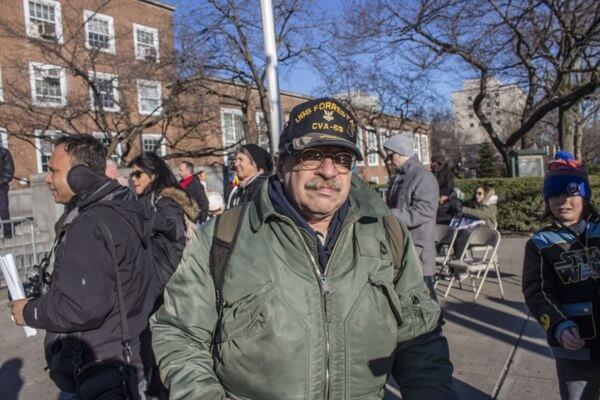By Patrick Donachie
Denny Meyer remembered the story his mother told him as a child, when she fled Germany in the aftermath of Kristallnacht, when the Nazi regime encouraged citizens to ransack Jewish businesses and religious institutions.
Meyer’s mother was 26, and thoroughly assimilated, but shortly after the 1938 calamity she bought a ticket for Holland, with her eventual destination being America. Her passport was stamped “J” for Jew.
“She saw what was happening; the writing was on the wall,” Meyer said. “Most people didn’t want to face reality.”
More than a month later, she landed in Ellis Island, passing the Statue of Liberty. She waited without papers as a refugee for more than a month before her request was processed and she was released with work papers. Meyer said she received five cents for the ferry to cross the river, saying it was “the only welfare she ever got.”
Meyer said his mother taught him that nothing was more important than “American freedom,” and he said this decree had guided him throughout his life as a civil rights activist, a service member of the Armed Forces, and now an activist for gay veterans and members of the military. He has made his home in Queens for more than two decades, continuing to fight for the causes close to his heart.
His activist career began at the age of 13, on a picket line outside a supermarket in Long Island that refused to serve black customers. The protesters were surprised to see a young child ready to protest, but offered him a placard. Meyer said he took a rock to the head thrown from a counter-protester, leading him to see that the change he sought would take longer than he ever expected.
In college in 1968, Meyer saw a group of anti-war protesters burning the American flag, which he said upset him. He decided it was “time to pay my country back for my family’s freedom.” He enlisted and served for 10 years altogether in both the Navy and Army.
“I was pretty young, 19 years old. Whenever young men join the military, they’re gung-ho, and they don’t realize they’re going to get their brains blown out,” Meyer said. “The reality didn’t sink in until much later.”
Meyer was facing an additional challenge that he could not reveal to fellow service members. At 15, he had realized he was gay, coming out to a friend for the first time during the 1964 World’s Fair in Flushing. In the service, stationed on an aircraft carrier, he could not reveal his identity for fear of reprisal.
“In those days, we served in silence. You had to be hyper vigilant everyday of your life. If you were talking about what you did during the weekend, you had to change the gender,” he said. “If they told a crude joke, you’d have to laugh. You also couldn’t acknowledge anyone else who was gay.”
Meyer never disclosed his sexual orientation during his time in the Navy. He worked on data retrieval before finishing his stint in the Navy, and eventually got a federal job for the Department of the Army overseeing the administration of Army Reserve units in San Francisco, and subsequently joined the reserves. He later decided he did not want to continue his military career.
“After 10 years, I had enough,” he said. “I got tired of looking over my shoulder in the supermarket to see if anyone from the unit would see me with my partner.”
At the time, many in San Francisco’s gay community were suffering from HIV or AIDS, including Meyer’s partner for 20 years. Meyer said it felt like there were two types of people in the city at the time: those who were dying and those who were their caretakers. In 1990, Meyer’s partner died, leaving him heartbroken, and he decided to return to his hometown of New York, eventually finding an apartment in Queens. He settled into civilian life before undergoing his own health battle in a bout with cancer. After encountering discrimination when trying to sign up for Veterans Association health benefits, he decided to contact the American Veterans for Equal Rights, and spoke to a retired colonel about the New York chapter.
“‘Where’s the New York chapter?’” Meyer recalled asking the colonel. “He said, ‘There’s none, you start it!’”
Meyer started outreach for the chapter during the 2002 Queens Pride Parade, attracting interest from more than two dozen gay veterans. Meyer continues his work as an advocate for gay veterans and equal rights, publishing work on his site Gay Military Signal, and speaking to universities and other gatherings when invited. He says he is trying to pass the torch to a younger crowd of activists, faced with a presidential administration that Meyer considers to be a unique threat to the country.
“Everyone thinks the battle for gay rights is over,” Meyer said. “It isn’t.”
Meyer has continued to protest the Trump administration, joining other veterans and community members at a rally outside Queens Borough Hall a few weeks ago.
“Times have changed,” he said, explaining his reasoning for attending the rally. “The reason I was there is my mother was an illegal immigrant. And I’m a veteran. So much for the idea that immigrants are here to destroy the country.”
Reach reporter Patrick Donachie by e-mail at pdona
































